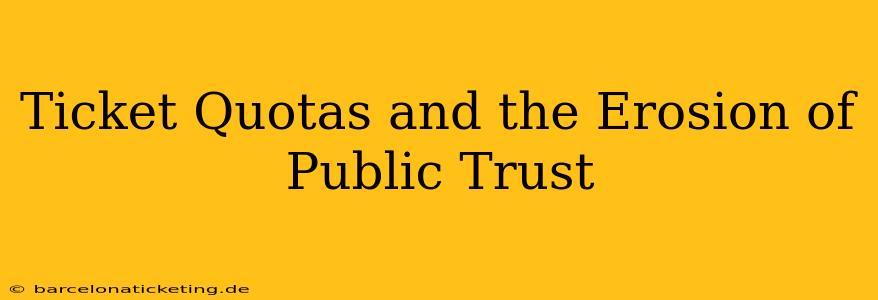The implementation of ticket quotas, often used in various sectors from entertainment to public services, has become a point of contention. While proponents argue that quotas ensure fairness and accessibility, critics increasingly highlight their potential to erode public trust. This article delves into the complexities of ticket quotas, exploring their intended benefits, unintended consequences, and the broader implications for public perception.
What are Ticket Quotas?
Ticket quotas represent a system where a specific number of tickets or access opportunities are reserved for particular groups or individuals. This could involve reserving tickets for residents of a specific area, members of a particular organization, or individuals belonging to an underrepresented demographic. The goal is often to promote inclusivity, address historical inequities, or ensure broader participation. However, the methods of implementation and the resulting outcomes are often sources of debate.
How Do Ticket Quotas Impact Public Trust?
The effect of ticket quotas on public trust is multifaceted and often depends on the specific context of their application. Several key issues arise:
Perceived Unfairness and Discrimination
One major concern is the potential for quotas to be perceived as unfair or discriminatory. If implemented poorly, they can lead to feelings of resentment among those who feel excluded or disadvantaged by the system. For example, a quota system that prioritizes one group over another, even with good intentions, can leave others feeling like they've been unfairly treated, leading to a decline in trust in the organizations implementing the quotas.
Transparency and Accountability
Lack of transparency in the quota allocation process significantly erodes public trust. If the criteria for selecting beneficiaries are unclear or if the process lacks accountability, it can fuel suspicion and distrust. People are more likely to accept quotas if they understand the rationale and believe the system is fair and equitable. Openness and clear communication are crucial.
Inefficiency and Inequity
In some cases, ticket quotas can lead to inefficiencies. For instance, if a large number of reserved tickets remain unsold, it could suggest that the quota system is poorly designed or that the needs of the target group haven't been accurately assessed. This inefficiency can further damage public trust, as resources are wasted and the desired outcomes are not achieved. Furthermore, well-intentioned quotas can sometimes inadvertently create new inequities if not carefully managed.
The Illusion of Fairness
Quotas might aim to address inequalities, yet paradoxically create the illusion of fairness while overlooking the root causes of unequal access. This superficial approach can mask deeper societal issues and fail to achieve lasting positive change, further contributing to cynicism and distrust.
Why is Public Trust Important?
Public trust is essential for the effective functioning of any organization or system. When trust erodes, it becomes more challenging to achieve desired outcomes, as people become less cooperative and more likely to question motives and processes. This can manifest in reduced participation, decreased engagement, and increased cynicism towards authority.
Are There Alternatives to Ticket Quotas?
Yes, there are alternative approaches to ensuring broader access and inclusivity that might avoid the negative consequences associated with quotas. These include:
- Targeted outreach and marketing: Focusing on specific demographics through tailored communication strategies can effectively reach underrepresented groups without resorting to quotas.
- Financial aid and subsidies: Offering financial assistance to those who cannot afford tickets can make events more accessible without creating a quota system.
- Lottery systems: A lottery system can provide a fair and transparent way to allocate limited resources, giving everyone an equal chance.
Conclusion: Finding a Balance
Ticket quotas present a complex challenge. While the intention is often to promote fairness and inclusion, poorly implemented quotas can have the opposite effect, damaging public trust and creating further inequalities. Transparency, accountability, and careful consideration of alternative approaches are crucial in finding a balance between promoting inclusivity and maintaining public confidence. The key lies in designing systems that are perceived as fair, efficient, and respectful of the concerns of all stakeholders. Open dialogue and a willingness to adapt and improve are essential for maintaining public trust in the face of increasingly complex societal challenges.

